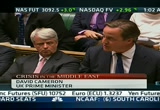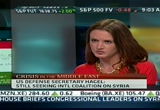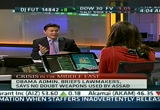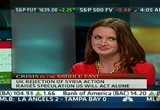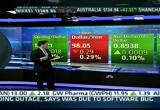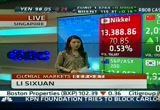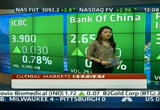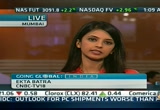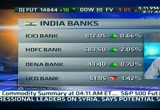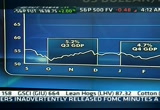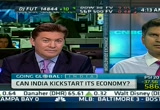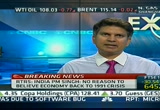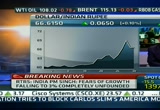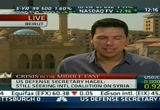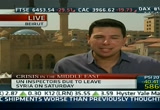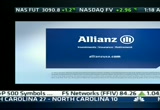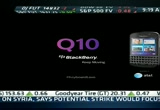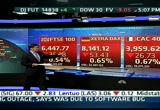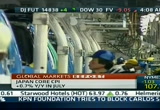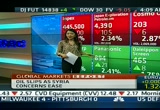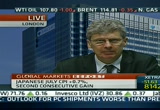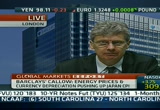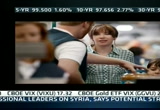tv Worldwide Exchange CNBC August 30, 2013 4:00am-6:01am EDT
4:00 am
you're watching "worldwide exchange." i'm ross westgate. a recap of the headlines. the u.s. government says it is still seeking an international coalition on syria, playing down speculation it will go alone. this after british lawmakers vote against taking action for the alleged use of chemical weapons. volatility continues ahead of india's crucial gdp release with growth expected to stay below 5% at decade lows. and shares of kpn plunge after carlos slim and america movil says it could drop the bid for the telecom group following a dutch foundation's move to block the takeover.
4:01 am
zurich insurance says it is looking into whether undue pressure was put on its late cfo before his death. also confirming the presence of a suicide note that mentions joseph ackermann. hello, welcome to the last "worldwide exchange" of the week. plenty to get through, though, on today's program. l'oreal jumped. is the world's biggest cosmeticmaker putting on the final touches to buy a stake of nestle. hamburg is one of the world's busiest ports. we'll be in hamburg to discuss at 10:35 cet. david cameron says he won't override the british parliament of syria, we'll speak to a
4:02 am
former u.s. ambassador of saudi arabia to get his take on the latest developments. robert jordan at 10:30 cet. while politician disease bait military strikes on syria, won atack push oil prices to record highs as prices are steady after midweek surge. more on than in an hour and a half. august comes to a close, we'll look at what kind of summer u.s. markets had. we'll be live at 11:45 cet. thoughts or comments, e-mail us, worldwide@cnbc.com. first, u.s. defense secretary hagel played down speculation that the u.s. is preparing to go it alone in syria after the british parliament struck down a vote on military action. following the surprise defeat, the british prime minister david cameron ruled out any involvement. >> i strongly believe in the need for a tough response to the use of chemical weapons, but i also believe in respecting the
4:03 am
will of this house of commons. it is very clear tonight that the -- while the house has not passed a motion, it is clear to me that the british parliament, reflecting the views of the british people, does not want to see british military action. i get that. >> hagel said the u.s. would continue to contusult with britn and other i'll lallies. officials told members of congress they had intercepted communications proving assad's regime carried out the chemical weapons attack. u.s. is expected to wait for a final report from the u.n. inspectors, due to leave syria on saturday, before deciding on the next course of action. hadly gamble joins us on set. it is interesting, where does the british parliament vote really leave the u.s., do you think, and president obama? >> really it leaves the u.s. in a tight spot. president obama has to make this a clear decision about foreign policy.
4:04 am
this is no longer just about chemical weapons being used in syria. this is now about basically iran and the broader region. we have iran influencing everything happening in syria at this point, the fallout there being in lebanon, in turkey. we also have the threat of a nuclear weapons program in iran. if president obama were to look weak on iran, what that means is inevitably there would be questions about his foreign policy. in politics, you can make and break promises every day but on foreign policy you want to stay strong. some are pushing back on the president, asking for more evidence month, time. congress is out of session now. who knows how long that kind of delay would setback any kind of missile action, missile strike. >> unlike the british parliament which makes fairly binding on the government, the president of the united states is commander in chief, can do what he likes and said we're going to take action. he can't hide behind -- he can't change his mind behind the fact, i don't have a choice.
4:05 am
>> exactly th. this is iran. he's been couching this in terms of national security and national security interests of the united states and what does that mean? it means the broader security of the region. we're basically in a bind because we have to protect israel, we have to make sure jordan and egypt are both secure, but also in terms of the iran nuclear debate. >> so what -- it is interesting, how do they gather international support if they're only going to be the only ones taking action? >> it is interesting. we have to wait and see about these u.n. inspectors if they come back with definitive evidence that mr. assad used chemical weapons and then expect to see more movement in the security council and france is having an emergency debate on wednesday. we'll have to wait and see. >> okay. hadly, thank you very much for that. of course, the fact that -- of that british vote effectively mean means that oil prices are a
4:06 am
little bit weaker again today. let's show you where we stand at the moment on the global map. dow jones stoxx 600 is down the at session, down 8 to 2. this follows a gain yesterday of 52 points for the ftse up .8%. uk market down half a percent at the moment. xetra dax down a third. cac quarante down half. and the ftse mib down two-thirds of 1% as well. let's look at where we stand with the bond markets. ten-year treasury yields, 2.77%. not a huge reaction to that. strong reaction out of gdp yesterday. was 1.77 first time around. even the most bullish forecast for 2.2. gilt yields, 2.76%. on the currency markets, dollar steady near four-week highs. that data helping the u.s. dollar. dollar yen, 90.07.
4:07 am
sterling dollar, 125.20. aussie dollar, .8938. euro dollar, 132.40 mark. in japan, a pickup on inflation is fueling optimism that abenomics is working. core cpi rising and beating forecasts and with help from the weak yen and higher energy prices. factory output rose by 3.2% but missed expectations for 3.7% rise. a report showed that the jobless rate fell to its lowest in nearly five years. household spending edged up. so how is japan data playing out? let's get a wrap on the final trading day of the week in asia. sixuan in singapore. hi, sixuan. >> thank you, ross. the abenomics is working, but the nikkei 225 lost half a percent today despite japan reporting a second straight monthly gain in core inflation.
4:08 am
the index lifted 2% for the week and also declined for the fourth straight month. the shanghai composite ended the day basically on the flat note, but still gained about 2% on the week. and over 5% for the month. this helped by decent economic data and corporate earnings. let me show you some top gainers and losers in japan. oil shares pulled back after yesterday's strong gains as those syria concerns eased. some exporters led support. panasonic shares jumped 2.4% today after saying the company will resume paying dividends for first time in about two years. meanwhile, earnings news very much in focus in china. banking majors icbc and bank of china both reported stronger than expected earnings. net interest margins helped steady while fees rose sharply. shares gained less than a percent on the shanghai composite. ping an insurance posted a 28% jump in earnings, this thanks to
4:09 am
the double digit profit growth from the group's banking unit and also higher investment returns. shares rallied over 3% today. back to you, ross. >> all right, sixuan, thanks for that. catch you later now. free-falling rupee and political paralysis, india's economy is hurting. gdp in the is expected to rise 4.7%, half the rate from two years ago, maybe insufficient for an ever blooming population like india's. ahead of the figures, the prime minister told parliament he expects a pickup in the second half of the fiscal year. that doesn't jive with analysts. bnp paribas slashed to 3.7%. with more, ekta batra has more. >> it is going to be a disappointing gdp figure if you look at the previous past
4:10 am
figures. but the consensus is picking up around 4.7%. the range for gdp is anywhere between 4.3 to 4.8%. to break it up, industry is the soft point this time around. it is expected to grow around 1% and any sort of disappointment on the downside will definitely be very, very disappointing for the markets. remember, industries will also be affected by the rupee depreciation. we have seen the rupee depreciate 22nd onward and the entire depreciation for the month of june as well as partially in may will possibly be reflected in the q 1 but more so in q-2 when the july tightening measures started by the rbi and hence we could see more of an impact coming there. otherwise, service is expected to slow, but agri is expected to be stable at 2.5 to 3%. back to you. >> ekta, thank you for that.
4:11 am
joining us with more at deutsche bank, thomas. if it slips below 4% next year, what are the implications? >> depends on how today's gdp pans out and to what extent the tightening measures of the rbi put in place last month stay. if this is a temporary tightness, i think the economy can still grow at between 4.5 to 5% for the financial year. but if we're going to have double digit colony overnight grades for several months and the bank convulse around it, then we have serious problems as far as growth is concerned for this year and next. mind you, monetary policy acts with a lag. if you're going to have several months of tightening now, it will be attractive growth for several quarters to come. >> yeah, look, they have got a
4:12 am
problem with -- should they -- can they try to not defend the rupee? should they just let it go. >> defending the rupee and tightening the overnight call rate are two different things. i disagree with the rbi there was a lot of speculation going on, the exchange rate and with the yield curve, they managed to arrest speculation and volatility. i think quite a contrary, the difference of the rupee was a straightforward reaction to the fed tapering that led to capital outflow. so india's job is to secure financing, whether it is through official means or private means by pressing for investors. short of that, we look to have problems with the exchange rate regardless of where the monetary policy means. >> so, look, take monetary policy out of it. if there is this plan to buy banks, to direct commercial banks to buy gold from ordinary citizens and try to divert it to refiners, is that a plan that
4:13 am
stacks up? >> well, i think there has been a slew of measures. if you add up all the measures, you're going it go into literally 30 to 40 measures. this is yet another one. the attempt is to re-use imports, to discourage gold imports. that money goes to something more productive. preferably not toward other imports. and to that extent, i think the authorities are trying to do the right thing, bring back some of the normalcy to the current account deficit situation. mind you, that also means there will be lower demand and lower growth. it is not a situation that is favorable in any stretch of the imagination. a question of trying to take the better part of the area. >> how do you see this playing out? always this view with india that i lot of the problems have been to some degree have been self-inflicted. >> indeed. and the risk going forward is
4:14 am
substantial. i don't think just because the rupee has corrected by 20% that, you know, we are going to see some positive dividend out of it anytime soon. the risk is, markets remain disorderly, exchange rates overshoot and that creates huge amount of real economic pain, whether it is in terms of repayment of debt difficulties for those dollars or inflation problems because of the exchange rate. it is nontrivial, it is serious and it has grave implications. >> does the rupee -- we take a little bit of pressure off it in the last couple of sessions, but is it going to remain under severe pressure, will it get weaker? >> unfortunately if we see continued volatility around taper, i think the exchange rate volatility will remain not just in india but other economies characterized by current account deficit. on the other hand, if it is just a question of domestic drivers of sentiment, i think some of
4:15 am
the measures that have been taken will help. the fact they are trying to take oil companies off the spot market and doing dollar spots with them, that ought to help on the margin in reverting the supply imbalance to a more millionable pla manageable plane. if they go out and talk about bringing some money back into the economy, that would help as well. it is also a fuchks of schedule market vulnerable tiz and volatility, something that india cannot do much about. >> all right, tom, thank you very much for that. we have comments out from the indian prime ministers. we're having that discussion, no reason to believe indian economy is in a similar position to 1991. believes economic growth will be around 5.5% this full year and as respect also says those who think indian growth fears of indian growth are falling to 3% are completely unfounded. indian tourists, the rupee slide
4:16 am
hits the vacation budget. tourism declined could fall further if the currency keeps depreciating. head to cnbc.com to find out more. back from india to concerns of the middle east. let's get more on syria. ayman mohyeldin is on the ground. we have been following movements in london and british parliament saying they're not going to take action. what does that mean and how is it being perceived? >> well, certainly the coalition at the u.s. perhaps earlier in the week thought it had locked up is certainly showing some signs of fracture, not only among the closest western allies who would probably be involved in some type of military operation if it were to be carried out, but also diplomatically across the region. there is growing concerns that the situation in which a strike would occur would be disastrous on a humanitarian level, but could also exacerbate the
4:17 am
region's already tense security situation. some of the countries closest to the united states including egypt, including jordan, have come out with their own reservations. jordan says it will not allow any countries to use its territory and air space to carry out strikes on syria. egypt, one of the closest countries to the united states, came out and said it rejects the use of foreign military intervention to solve the crisis. some of the u.s.' foes in the region have vowed to defend the syrian government in the event of a possible strike, one way or the other, saying it would lead to regional war that would not end favorably to the united states. and against that backdrop as we were saying, the humanitarian situation continues to worsen. jordan already buckling from more than 150,000 refugees that have set up their thousands of pouring into iraq and turkey and lebanon unofficially. it is making for a few tense days while the international community decides what is to happen. the u.n. weapons inspectors visiting the site of the alleged
4:18 am
chemical weapons attack are still inside. they're expected to leave on saturday to possibly submit their findings for a possible another round of voting at the u.n. security council. >> thank you very much. still to come, l'oreal impressing investors with a rise in first half profit despite weaker demand from developed markets. stay tuned. the ceo tells cnbc why he's remaining tight lipped over plans to buy nestle's stake in the cosmetics giant. [ male announcer ] i've seen incredible things. otherworldly things. but there are some things i've never seen before. this ge jet engine can understand
4:19 am
5,000 data samples per second. which is good for business. because planes use less fuel, spend less time on the ground and more time in the air. suddenly, faraway places don't seem so...far away. ♪ time to have new experiences with a familiar keyboard. to update our status without opening an app. to have all our messages in one place. to browse... and share... faster than ever. ♪ it's time to do everything better than before. the new blackberry q10. it's time.
4:21 am
shares of kpn have taken a dive. doubts have arisen over the takeover of the company. this after the kpn foundation took up an option to buy nearly 50% of the firm. the foundation says it intervened to protect the interests of shareholders and employees and customers and dutch society. america movil released a statement saying it remains committed to the deal but will abandon the bid unless the foundation changes its stance. zurich insurance group says its board will investigate whether undue pressure was put on its ceo who was found dead on monday. an apparent suicide note had
4:22 am
been found, and that its content related to the relationship between waltier and joe ackerman who stood down earlier this week. a near record 14% rise in earnings. operating profit of 584 million euros thanks to continued demand for the iconic leather and silk products in europe and the u.s. the group cautioned its bank sales were being limited by production capacity. hermes shares up 2.7% in paris. on the up, french cosmetics giant l'oreal after they posted a 7.7% rise in first half earnings. they have been speaking exclusively to cnbc after the results and speaking to stephane pedrazzi. >> ross, first of all, the numbers for the first half of the year, if you remember in july, when the company announced its sales for the first half of the year, they were disappointing because they were
4:23 am
weaker signs of -- signs of weaker demand than some markets like in the united states. but l'oreal was able to report nearly 8% increase in first half operating profit. and the group most importantly was a vote to improve its gross margin to a record level 70 basis points higher, driven by the new and more expensive products such as anti-aging creams at lancome, one of the brands in the portfolio. l'oreal also announced that it's getting ready to buy, if necessary, the 29.9% stake that nestle has in l'oreal from the next year. that's an important announcement because that stake is valued at nearly 22 billion euros. even if in the end the decision doesn't belong to l'oreal, that's what the ceo told us this morning. >> it is not our decision. the decision is nestle's ball. nestle's ball has said they are
4:24 am
looking at all options and i think it is perfectly natural and normal. this is their job. what we are simply saying is that we have the resources, financial -- strong financial resources with our treasury, with the stake we have, which is worth 9 billion euros, to face all options. >> on that question, earlier this week the ceo of nestle told a swiss newspaper it would not extend the purchase agreement with the family, the largest shareholder of l'oreal, and that if l'oreal needs to raise cash to pay for the stake, it could sell its 9% stake because the ceo told us this stake was nonstrategic. results plus speculation on that share purchase, the stock is trading much higher on the french market this morning.
4:25 am
up 4%. and really outperforming the french market which is in the red right now. >> doing well. stephane, good stuff. catch you later. carl icahn raising its rate to 6.9%. icahn says he bought the shares because he believed they're undervalued. the case for most purchase of shares. up 2% after hours. microsoft is reportedly in talks to make a big investment in four square. the app created in 2009 lets users report the location via mobile devices on social media. four square has 4 million users. an investment would help microsoft list searches on bing. the outlook for the struggling pc market may be worse than previously thought. idc is cutting its 2013 outlook
4:26 am
for the second time this year. it now expects global pc shipments to drop nearly 10%. more consumers shift to mobile devices. in march, idc predicted shipments would fall 1.3%, but cut that off to drop off 7.8% in may. idc is reducing tablet forecats this year, pointing to the growing use of smartphones with bigger screens. and the tooth fairy, not carrying around as much loose change anymore, leaving an average of $4 per tooth under the pillow, according to a new survey by visa. that's up around 23% from last year. that's some inflation. and a 42% spike from 2011. the biggest reason for the insizer inflation, parents don't want their children to be the ones who got the least amount of cash. nothing like peer pressure. visa has a tooth fairy calculator app which gives you an idea of how much parents in your aim group and income bracket are giving their
4:27 am
children. so we want to know, have things gone too far? is the tooth fairy being paid far too much? and if they are, it is your fault. share your view, e-mail us, worldwide@cnbc.com, tweet @cnbcwex or direct to me @rosswestgate. it is in everybody's interest that the tooth fairy isn't overpaid. still to come in a few moments time, we'll continue to follow the latest developments out of syria as we await a decision in washington on the next course of action. the former u.s. ambassador to saudi arabia robert jordan joins us from dubai. and also with us from hamburg this morning, annette giving us the german perspective in syria and the latest on the buildup to the country's looming federal election.
4:30 am
these are the headlines from around the globe. u.s. government says it is still seeking an international coalition on syria, playing down speculation it will go it alone. this is after british lawmakers voted against taking action for the alleged use of chemical weapons. india's prime minister rejects talk of an economic crisis ahead of the country's
4:31 am
crucial gdp release with growth expected to stay below 5% at pn carlos slim and america movil says it could drop its bid for the telecom group following a dutch foundation's move to block the takeover. and zurich's insurance says it is looking into whether undue pressure was put on its late cfo before his death, also confirming the presence of a suicide note that mentions joseph ackermann. european equities are down today after recovering a little bit yesterday. off two-thirds. xetra dax and cac quarante down. off a percent for the ftse mib on the bond markets. treasury yields, steady, 2.77%. around 2.78% on the yield of the european close. gilts a little below that at the moment. bunds yielding 1.84%, discount from bunds. on the currency market, dollar
4:32 am
holding on to four-week highs. the good gdp version helping the dollar yesterday. dollar yen on the 98 mark, coming back slightly. euro dollar flat at 132.40. german chancellor angela merkel and president barack obama agreed in a phone call said they're set to work together on a possible international response. annette is with us from hamburg. annette? >> angela merkel spoke to putin and as well spoke to obama and both outcomes sound a little bit different. why she's very much agreeing with obama that there should be some retaliation against what happened in syria, but putin, the outcome was more along the lines that can only be political -- to the conflict.
4:33 am
for angela merkel really stands is not very much clear and that's one of her secrets, i would say, that she's never really committing to any big, big standpoint because it could be hugely unpopular because germans don't like the idea about war in syria. recent polls suggest that almost 60% of germans don't want to have a war in syria, and if there were a war in syria, only 40% say germany should support that war, meaning by materiel, not by soldiers. speaking about foreign relations, we switch to as well expert relations, that's actually the reason why i'm here in hamburg, to cover the export german economy on my travels through germany. actually, more than 50% of gdp in germany is made from exports.
4:34 am
and one person who is very much aware of how sensible this industry is to worldwide economies is the ceo of the hamburg port authority who is standing right next to me. thank you very much for joining us here. my first question would be how is the hamburg port doing right now? it is such a volatile world trade environment. >> i think the port of hamburg is the backbone of the economy. in hamburg, the numbers speak for themselves. there is a lot of employment, more than 261 people employed by the port. and i think the numbers are really quite well, you know. we had the big crisis 2009. we reached the bottom. since that time, the numbers are going up. the product of hamburg increased its market share rapidly. we're the biggest -- largest
4:35 am
german universal port. and it seems to be that the trend goes on. >> are you afraid of geopolitical tensions in the middle east? >> we already had an impact with some crisis in the middle east. so, you know, you see some small scale impact in the figures, but, you know, the main partner federation and the south, southeast and eastern part of europe. so dependency through the middle east is not quite great to the point of hamburg. >> we're very much depending here in china -- not here in china, in germany, on china, i should say. we're seeing a slowdown there as well. do you think that as well the german or the hamburg port will be a factor? >> we saw a slowdown in china also here in the port of hamburg, but was a big expense with the increase of the russian federation and some other
4:36 am
states. also the united states. but when you look at the -- you know, the real figures, the creation in hamburg, you see the port of hamburg creates more than 20 billion euros income here annually, and custom declaration number 7.6 billion euro generated by the port, and when you see the trend overall, big numbers, changes all over the world, but when you -- in summary, i think the trend is going up and globalization will go on. >> the ocd saying trade will pick up and at one point in time there could even be a lack of ships. do you think that could be the case? >> we see the trend that the number of ships were reaching the port of hamburg does not really increase, but the ships getting bigger. so the number is more or less
4:37 am
stable, but the size is much bigger, so the volume they can carry is bigger so the through port and the port is increasing and that's a trend we see right now. but there are a lot of ships in the order lines and we think the number of ships will increase again. >> okay. thank you very much for your time. there is a lot of insecurity about the outlook for the shipping industry as well. of course, here on the german side, germany is actually -- germans i should say possess the bulk of the container ships. and, of course, there is a lot of overcapacity still lingering on. with that, back to you. >> annette, thank you very much for that. great to see that shot of hamburg as well. let's pick up on the discussion. u.s. secretary hagel played down speculation that the u.s. planning to go it alone in syria after parliament struck down a military action. the british prime minister ruled out any involvement by the uk
4:38 am
saying the government would respect the wishes of the people. >> i strongly believe in the need for a tough response to the use of chemical weapons. but i also believe in respecting the will of this house of commons. it is very clear tonight that while the house has not passed a motion, it is clear to me that the british parliament reflecting the views of the british people does not want to see british military action. i get that. >> speaking this morning, hagel said the ugs .s. would continue consult with britain. comments come after the obama administration held a conference call with u.s. lawmakers last night. officials told members of congress they had intercepted communications proving assad's regime carried out the chemical weapons attack. the u.s. is expected to wait for a final report from u.n. inspectors due to leave on saturday before deciding on the next course of action. joining us on the telephone from dubai, robert jordan, former
4:39 am
u.s. ambassador to saudi arabia under president bush. with us on set, very own hadley gamble. thank you for joining us. how difficult is the position the president now finds himself in with that vote in the british parliament? >> it certainly makes it more difficult to undertake any kind of attacks without a broad level of support from an ally like britain. frankly, the president placed himself in a box by making these red line statements as early as a year ago, and at some point the credibility of the united states is at stake, which goes beyond what the british parliament is concerned with. >> that mean he has to at some point carry out an attack? >> well, to maintain american credibility on statements like this, and to more importantly
4:40 am
deter the use of weapons of mass destruction, like chemical weapons is going to be very important, i think, for the united states to take some kind of firm action that punishes syria for these outrageous acts and sends a message not only to syria, but to iran for the use of weapons of mass destruction will not be tolerate d. >> bob, it's hadley. when you're talking about the saudi arabian government and talking about the emirates and the gulf country, what is their view? you have close relationships in saudi arabia. they're watching this, wondering when the president is going to take action, do they think he's going to do this soon? >> they have lost a lot of confidence, i think in this administration. they don't feel as close to american policy as they once did. this began with the fall of mubarak in egypt. i think they trust us a bit less and so our credibility is at stake with them on this issue i
4:41 am
think as well. the arab league said they don't want military action now. i believe the saudis and the emirates would be willing for us to make some sort of military response here and would at least quietly support us. >> bob, do you think it is inevitable the u.s. is going to take action whether or not they have international support? do you think that international support is going to be a boon or they'll bother to wait for it? >> well, the inspectors of the u.n. are still in syria. i believe they leave tomorrow. they certainly won't take action until the inspectors have left. it is possible they're waiting for some sort of signal from the inspectors if they believe it is going to be a serious indictment of syria. they will proceed, i think, without british support. there may still be french support. there may still be turkish support. and perhaps some others. but certainly trying to marshall the support of the international
4:42 am
community has been dealt a blow by the british parliament. >> you mentioned that the relationships with the saudi regime have deteriorated with this administration. why is that? >> well, first of all, our interests are not perfectly aligned. with the united states becoming a more self-sufficient producer of oil, the oil card isn't as strng as it used to be. second, i think the disaster that we saw in iraq in which the saudi foreign minister said we turned iraq over to iran on a silver platter has dampened the enthusiasm of the saudis for some of our foreign policy activities. we're also at the same time very much aligned in our interests in fighting terrorism, fighting al qaeda, and so our relationship has become much more transactional. it is not based on complete
4:43 am
identity of interests. and certainly not on cultural affection. but it is based on a series of and sliding scale of interests, some of which will align and some of which won't. >> so right now, if we do expect some u.s. action, what are -- how big are the risks in your view? is it possible to take some limited action that doesn't spread? >> there is always risk. my view is that a targeted and precise attack on concern targets such as military air strips, aircraft, perhaps command and control centers would send the kind of message that might hopefully have a deterrent effect on syria. and send a message that we don't tolerate what has been done. a broader attack trying to hit the presidential palace, trying to hit chemical weapons depots,
4:44 am
would probably back fire in a way this would not be productive. >> okay, robert jordan, thank you very much for joining us this morning, former u.s. ambassador to saudi arabia. hadley, thank you as well. still to come on the show, emerging market specialist says africa is china 20 years ago. to discuss that right after this break. [ kitt ] you know what's impressive? a talking car. but i'll tell you what impresses me. a talking train. this ge locomotive can tell you exactly where it is, what it's carrying, while using less fuel. delivering whatever the world needs, when it needs it. ♪
4:45 am
after all, what's the point of talking if you don't have something important to say? ♪ time to have new experiences with a familiar keyboard. to update our status without opening an app. to have all our messages in one place. to browse... and share... faster than ever. ♪ it's time to do everything better than before. the new blackberry q10. it's time.
4:47 am
so, as we saw yesterday, indonesia's central bank hiked 50 basis points in a surprise meeting. deputy governor, thank you for joining us. you had some success with the move yesterday. and the fact that some of the pressure has been taken off the rupiah. but, raising rates is one thing, getting to grips with the current account deficit would be much more helpful. what progress do you think can be made on that?
4:48 am
>> well, the past week we also post content of import. we also are doing, you know, the training from controlling the lending. as we said, there will be also lending and slowing the domestic demand and slowing the income. i think we -- all that we can use to lower that will be important including also to, you know, to curb inflation pressure. lending and liquidity in the
4:49 am
market. >> clearly the interest rate hikes come with an impact on growth. where do you think growth is going to slow to? >> that's the objective, to lower domestic -- we are forecasting growth will be slowing this year or two for a big percent. i think that's our, you know -- there will be, you know, how we slow liquidity. >> meanwhile, how much of a struggle is it going to be to limit the collateral damage from when we get a shift in u.s. policy, when the fed starts to taper. we already have seen the prospect of that is hurting a lot of emerging markets, how best can you limit the damage
4:50 am
4:51 am
joining us. bank of indonesia's deputy governor on the phone from jakarta. apologize for some of the quality of the sound on that. right, we have been looking at frontier markets all this week. it is time for today's final assessment. julia has got that. >> despite abundant natural resources, africa remains the world's poorest and most underdeveloped continent. across africa, high levels of it literacy, lack of access to foreign capital and frequent conflict have restricted development. however, during the visit of president of the united states barack obama in july, he announced a $7 billion plan to further develop infrastructure and work more intensively with african heads of state. well, the index charts a meteoric rise over the last year. emerging market specialist mark
4:52 am
mobius says africa is in the same development spot as china or india two decades ago. the continent's trade with china ballooned from about $11 billion in 2000 to $166 billion last year. but what are the pitfalls? guiana, nigeria, kenya battling with high inflation and weakening currencies. how will the continent cope when the cheap money finally ebbs away. final day focusing on frontier markets, we'll ask if africa is t the place for your investment. >> we'll pick up that discussion with international economist and author dambisa moyo. out of all of the frontier markets, is that something you fundamentally agree with? >> absolutely. i think so much happened in the last five to seven years that i think it is probably closer, i would say probably last 15 years as opposed to 20 years.
4:53 am
i think in a way it is a sort of false dichotomy to put africa as a separate story to what we see in the frontier markets in general. if you look at headline growth story, africa this year will be among the top three fastest growing regions according to the iimf's most recent forecast. but more than that, if you look at developments in risk assessment and also in terms of liquidity, the story is incredibly compelling. >> if you compare frontier market, there is enormous outperforman outperformance. why frontier markets in a different space? >> there is a fantastic question. i think one of the things that people do incorrectly is to sort of assume the correlation between developed markets and emerging markets and developed markets and frontier markets would be the same. what you see is that there is a
4:54 am
real compelling story for diversification because the correlations are not as aggressive as you would see. a lot of that stems from the integration of trade, for direct investment, much more integrated for the emerging markets, traditional bricks than for the frontier economies. >> what is it the frontier economies have? when we have been looking at the impact of fed policy, clearly we just saw it in indonesia, large current account deficits you're getting killed. in frontier markets, do they have low levels of debt, less reliance on funding? are these issues they don't have? >> that's a mass issue. i think you're right to stress there is a delineation between the structural story, which is around capital labor, long-term productivity gains which i remain constructive and positive about, but also we have to take into account the more short-term tactical issues that remain. what happens with the tapering, how will not just africa, but
4:55 am
the frontier markets and emerging markets in general cope. concerns around capital outflows, depreciation of weakening of many of the currencies, as much as double digits, worries about inflation, are particularly a problem for frontier markets and also for african economies. we have seen some debt in the market over the past 12 months. >> the key thing is what currency issued? >> they are going to hurt -- i think the confluence of a slowdown in china, and the concerns around the tapering, which have been a driver in the appreciation of the u.s. dollar are all things that -- factors that drive the concerns. and in a way, i think it is a good thing. it will separate the chafe from the corn. those countries that managed their economies well, have great fiscal policy, real credibility, will be able to survive and weather the storm. >> demographics, is that one of the structural factors? >> absolutely.
4:56 am
i think economists are boring in this regard. we tend to look at three thins, really. we look at capital. your debts and deficits, look at labor in terms of both the quality and quantity of labor, and also productivity. and if you look at the african economies, and also frontier economies more generally, in that lens, the story is very compelling. the average debt to gdp ratio in the capital stories around 42% for african solvent. look at the labor story, 60% to 70% of the populations under the age of 25. and despite what the electroductry comments were on your show, there have been significant gains in education. nowhere near as fast as we would like to but moving in the right direction. in terms of productivity, they're absorbing technology from the rest of the world is a big plus. >> yeah. and finally, look, you're on the board of bank. you issue a note earlier, you're on the board of gold producers, what is your view about gold at
4:57 am
the moment? besides about you are on board at the bank what do you think is still supportive? >> i think my general view about gold is that it's really, to me, trades more as a currency than as a commodity. i think it has to be looked at in that regard. it obviously has a flaw to the extent that it is still part of portfolios of central bankers and view ed as an important currency discussion, not just a commodity. if you look at demand and supply, it seems to me the story is compelling to 1400. >> always good to talk to you. come back sooner than you were last time. >> absolutely. >> dambisa moyo joining us. we'll take a short break. still to come, the latest on syria, firm action to the assad government.
4:58 am
4:59 am
hoveround is more maneuverable to get you through the tightest doors and hallways. more reliable. hoveround employees build your chair, deliver your chair, and will service your chair for as long as you own your chair. most importantly, 9 out of 10 people got their hoveround for little or no cost. call now for your free dvd and information kit. you don't really have to give up living, because you don't have your legs. hoveround replaced the legs. and now every hoveround comes with this handy tote bag and cup holder for access to your favorite items. and right now, get this limited edition hoveround america travel mug free with your hoveround delivery. [singing] hoveround takes me where i wanna go. call or log on to hoveround.com to find out where a hoveround can take you!
5:00 am
you're watching "worldwide exchange." i'm ross westgate. u.s. government says it is still seeking an international coalition on syria, playing down speculation it will go it alone. this after british lawmakers vote against taking action for the alleged use of chemical weapons. rupee volatile continues with growth expected to stay below 5% at decade lows. shares of kpn plunge after carlos slim america movil says it could drop the bid for the telecom group follow a dutch foundation's move to block the
5:01 am
takeover. and zurich insurance says it is looking into whether undue pressure was put on its late ceo before his death, and confirming the presence of a suicide note that mentions joseph ackermann. also looking for the latest inflation and unemployment details out of the eurozone. let's bring you that right now. eurozone august consumer confidence first of all minus 15.6 in july from 17.4. also got the jobless rate. the eurozone july jobless rate 12.1%. 12.1% in june. the july jobless rate, no surprise there. the numbers falling for the second consecutive month.
5:02 am
the cpi estimate, we have got that 1.3% versus july's 1.6%. and that's weaker than the forecast 1.4. no concerns about inflation, down at 1.3%. the jobless total falling 15,000 to 19.23 million. julian counter joins us now. youth jobless is increasing, julian. inflation a little weaker than we thought with the cpi, but at one point 3%. i don't suppose we'll have any policy responses on either of those things. >> no, that's right. it seems to me that the euro area does really quite badly need some extra stimulus here now. it must be said there is a very gradual recovery that is unfolding and i think you see that in the fact that you were saying the actual level of
5:03 am
unemployment has fallen with its latest reading. so that's an encouraging sign. and we are seeing a stronger business confidence reading coming through. at the same time, we have a very high late level of unemployment rate, unemployment there at 12.1%. and this is catastrophically high in some parts of the euro area, in the sense that people are losing their skills, becoming very long-term unemployed here. at the same time, i would say if you look at the inflation data, you have a reading of 1.3%. that came in a little bit on the downside of expectations there. i don't know what the call was, but i know we were thinking it was going to be about 1% only. so core inflation is running at very, very low rates. at the same time, you are seeing still the impact of government measures and other tax increases that are adding a few tenths to that core inflation rate. if you stripped that out, it
5:04 am
would be below 1%. there is a case that the ecb is not still doing quite enough. when you compare it with the fed or the bank of england or the bank of japan, given this very, very weak inflation situation, very, very high rates of unemployment and the fact that the fed is starting -- going to be tapering very clear in the next few months if asset purchases. at the same time, the u.s. monetary policy is becoming less stimulated and the euro air has been very reliant on exports for growth and now those have been stagnating, which really indicates they need to get domestic demand going more here. >> julian, stay there. talking about european politicians, francois hollande commenting on syria, saying all options are on the table for intervention insisting france can take action without britain. at the same time, u.s. defense secretary chuck hagel played down speculation the u.s. is
5:05 am
preparing to go it alone after the british parliament struck down a vote on military action. david cameron ruled out any involvement by saying government would respect the wishes of the people. >> i strongab believe for the nd of a tough response to the use of chemical weapons and i also believe in respecting the will of this house of commons it is very clear tonight that while the house has not passed a motion, it is clear to me that the british parliament reflecting the views of the british people does not want to see british military action. i get that. >> all right. after that, as well, hagel said the u.s. would continue to consult with britain and its other allies in a bid to form an international coalition on syria. his comments come after the obama administration held a conference call last night. officials told members of congress they had intercepted communications proving assad's regime carried out the chemical weapons attack. they're expected to wait for final report from the u.n. inspectors, due to leave syria
5:06 am
on saturday before deciding on the next course of action. hadley gamble is with us on set. julian is still with us as well. it is interesting, these comments from hollande. are we looking -- do you think the prospect of french, coordinated french and u.s. military action. haven't seen that for a while. >> we haven't seen that for a while. what i'm looking at now is the risk appetite, despite the rhetoric from germany, france and david cameron, despite the rhetoric from leaders, the risk appetite for any kind of action in syria is low when it comes to the people of these countries. i think that for the u.s., they're still going to have to consider the possibility of going it alone and understanding why they're going to have to do that because this is now much more of a story not just of syria and chemical weapons, but broader story about u.s. foreign policy and making sure that if the us president is going to draw a red line, that he actually can follow through. >> he boxed himself into a corner. he's got to do something, right?
5:07 am
otherwise presumably how is his standing, you know, going to fare particularly in the faces of countries like iran. >> iran, the nuclear weapons program and the fallout of the region, hezbollah has been funding the assad regime. at this point, he's got to do something. it is a question of whether he will have an international consensus. >> okay. hadley, for now, thank you. all right. so just joined us this morning, state side, we had u.s. markets up for two days in a row. european equities fairly weak. this is where we stand with futures. currently dow up 6 points. the nasdaq is about half a point above fair value. and we're about two points above fair value for the s&p 500. the ftse yesterday was up 52 points. .8%. pretty much lost that today. down .5%.
5:08 am
down two-thirds for the german market. ftse mib down a half at the moment. bond yields, treasury yields kind of hit this 2.77 level. we sort of stayed around that. the european close yesterday, the yield on the ten year t-bill, 2.78. gilts below that. bunds are slightly lower, 1.83 as well. on the currency markets, dollar holding up near four-week highs against the basket of currencies. dollar yen above the 98 level. right now, sterling dollar just below 155. euro dollar very flat, 132.46. meanwhile, had to pick up japanese inflation which fouled optimism that abenomics is working. nationwide core cpi soared to the highest in five year in july. up .7%, which beat forecasts. albeit with the help from the weak yen.
5:09 am
separate reports showed the jobless rate fell to the lowest in nearly five years. household spending edged up. and to recap the impact of that, sixuan filed this report. >> thank you, ross. the abenomics is working, but the nikkei 225 lost half a percent today despite japan reporting a second straight monthly gain in core inflation. the index in fact slipped 2% for the week and also declined for the fourth straight month. the shanghai composite ended the day basically on the flat note, but still gained about 2% on the week. and over 5% for the month. this helped by decent economic data and corporate earnings. let me show you top gainers and losers in japan. oil shares pulled back after yesterday's strong gains as those syria concerns eased. but some exporters led support. panasonic shares jumped 2.4% today after saying the company
5:10 am
will resume paying div dens for the first time in about two years. earnings news, very much in focus in china. banking majors icbc and bank of china both reported stronger than expected earnings. net interest margins helped steady while fees rose sharply. shares gained lessen this a percent on the shanghai composite. ping an insurance, the country's second largest insurer, posted a 28% jump in earnings this thanks to the double digit profit growth from the banking unit and higher investment returns. shares rallied over 3% today. back to you, ross. >> sixuan with a wrap in asia. julian is still with us. what do you make of the five-year high for japanese inflation. it is only .7%. but in the context of where they have been, is this proof abenomics is starting to work? >> it looks like it on the surface. i think if you go down, you can see that most of that inflation is really coming through energy prices and utility companies.
5:11 am
in japan, there has been a very strong rise in yen denominated oil prices there. that's feeding through very substantially. at the same time, the utility companies have also been raising their prices. and i think if you look beyond that, you're not still seeing that much evidence of an underlying pickup in japanese inflation here. but, of course, the policy of kuroda and the government really is to fuel expectations of higher inflation here and they believe that by doing so, that will prove self-fulfilling. and when you are seeing headline inflation numbers, and you are getting people noticing the petro pump and when they pay their utility bills, prices have been rising, then certainly that is going to be helpful for the overall strategy, i would say, here at the same time, it is our view that, again, there is not really enough stimulus, even though it looks very large.
5:12 am
still to really be generating 2% inflation on a sustainable basis because we have got to remember here that japan, of course, had so many years around 15 years of mild deflation, so to actually shift inflation rate up by that degree, by 100, by 300 basis points is quite a big challenge for them. >> julian, stay there. we'll come back to you, take a short break. india's prime minister says there is no reason to believe the economy is returning to the crisis days of 1991. the rupee continues to slide. investors, are they believing him? we'll be in new delhi next ahead of the latest gdp figure. usua l please. usua thank you very much. ok guys, i'm back. i need a template of a template. oh my gosh. i've never even seen this record, i've only read about it in books. yeah we can get some peanut...that is huge. please don't judge the amount of peanut butter we are getting. from prepaid to platinum, cashback and more membership has a card for every character.
5:13 am
i'm carrie brownstein and i get to be whoever i want. this is what membership is. this is what membership does. [ agent smith ] i've found software that intrigues me. it appears it's an agent of good. ♪ [ agent smith ] ge software connects patients to nurses to the right machines while dramatically reducing waiting time. [ telephone ringing ] now a waiting room is just a room. [ static warbles ]
5:15 am
and recap of the headlines today, the u.s. downplays speculation it will act alone on syria. francois hollande says all options are still on the table. indian rupee continues ahead of the crucial gdp release. and billionaire carlos slim faces a setback in his 7 billion euro bid for kpn. a free falling rupee, current account deficit and political paralysis, india's economy and finances are hurting and today's gdp figures could show growth falling to dangerous
5:16 am
lows. it is expected to rise for june to a mere 4.7%, around half the rate from two years ago. and maybe insufficient for population that is booming like india's. manhoman singh said he expects a pickup in the second half of the fiscal year. shirene balm is with us. >> there is caution as far as the pickup in q-2 is concerned. we have seen the rupee depreciating 20% since the 22nd of may, followed by intervention by the reserve bank of india which tightened liquid sy significa significantly. the full impact will show in q-2. there is caution in terms of what the numbers could look like, but government reaffirming they're hopeful of a pickup in the second half of the year. possibly because of the fact that we had a good -- in india
5:17 am
and they believe agriculture growth will upset some of the decline we're going to see in the services sector, for instance. agricultural growth is expected for q-1 to come in excess of 3.5%. that is the only silver lining. as far as the q-1 gdp numbers are concerned, consensus on street, 4.7%. the street is factoring in a number lower than that. the ranges they're working with is 4.3 to 4.8%. if it is lower than 4.7%, there is going to be a negative reaction coming in from the markets. let me take you through some of the key brokerages and what they're pegging as far as gdp numbers are confirmed. bnp paribas coming in at a dismal 3.7%. that is the lowest estimate i've seen. cnsa pegged the growth by 14, between 5.2%, the earlier estimate 5.5%. there will be a slowdown in the services sector. growth expected to come in between 6 to 6.5%. the worries really are with the rupee depreciationing.
5:18 am
yesterday we saw a pullback, fairly sharp recovery, the worries continue to be on whether india can manage the fiscal account deficit. the finance minister said there are red lines on both, will not be breached. >> the prime minister says this isn't 1991. but 1991, that crisis did herald a major structure reform that put india on the growth path. so is there any sign actually that debt of this current crisis may do something similar? is it at some point the politicians going to get their act together? >> well, the politicians have got their act together, but the worry is that the politicians are working to pass legislation that is seen as populist, that is seen as being fiscally expansionary because if you look at two crucial bills passed over the past 48 hours, the food security bill, which could cost
5:19 am
ruppi i rupees for the upcoming fiscal and the impact could be worse and the land acquisition bill, passed by the lower house of parliament late last night that could see project costs go up significantly and see the cost of housing go up by 20% to 25%. the bills and legislation that is being passed at this point in time perhaps would not be good as far as industry is concerned. but would give this government a better chance at elections. >> thank you for that. great to talk to you. julian is still with us. julian, look, part of the problems that these countries current account deficits have is they're also being impacted by the prospect as you say of a fed easing back on liquidity. the u.s. federal reserve doesn't really -- it appears to be they're not going to worry what happens to emerging markets, but should they, bearing in mind emerging markets account for half of global growth? >> it is a fair point, but at
5:20 am
the end of the day, i think it is made clear that all central banks have to really act in international interest. if you start factoring in other implications of that, then, of course, you could end up in quite a lot of difficulty here. let's just give the fed some degree of credit. i think for the fact it has very successfully been pursuing policies, first of all, rescue the u.s. from the financial crisis, and then the recession and we are seeing a very steady decrease coming through still in the u.s. jobless rate. it happens to be falling pretty much exactly in line with the average rate of decrease in the u.s. unemployment rate that we have seen in the last five cycles. i think the u.s. fed has been doing a good job. i think really the message is that emerging countries need to really focus on policies right for them, the difficulty they have is there have very large international fund flows, particularly from mutual fund investors and very, very clear that those flows are having this very important impact in leading
5:21 am
to the currency tensions and leading to the bond and equity market weakness we have been seeing. at the same time, i would take some degree of comfort in the fact that there does seem to be a lot of discrimination going on at the moment in terms of how investors are moving money around. it is not entirely exactly linear as you would expect, but suddenly the countries with the bigger external financing needs, the countries that had the biggest inflows in other words, are those that are tending to suffer more from the outflows. i would still regard this myself as more of a correction and probably a healthy correction rather than a rout that will be destabilizing. >> julian, good to talk to you. still to come, germany's angela merkel reportedly joining the uk in ruling out military action in syria. find out. we'll be in hamburg with reports right after this. [ male announcer ] it's time.
5:22 am
5:23 am
5:24 am
5:25 am
counting down, of course, to the german elections for us, which are being held in september. she's in the port of hamburg. we have a problem getting the line up. we'll go to her in a few moments time. let's recap where we stand with european markets and the futures now. u.s. futures after we saw u.s. markets up for the second day in a row, just under .1%. currently about 20, 34 points above fair value at the moment. the nasdaq is some six points above fair value, the s&p 500 is currently three points above fair value. this follows a negative day for european equities. down around half of 1%. ftse up .8%, giving back some gains in today's session as well. so that's where we are with the ftse. haven't got that on the screen for you. some individual corporate stories that we're looking at, shares in dutch telecom group
5:26 am
kpn have taken a dive, doubts arisen over america movil 7.2 billion euro takeover. this is after they took up an option to buy nearly 50% of the company. the foundation says it intervened to protect the interest of shareholders and employees and customers and dutch society. carlos slim's america movil released a statement saying it remains committed to the deal, but will abandon the bid unless the foundation changes its stance. zurich insurance group said its board will investigate whether undue pressure was placed on its finance chief who was found dead on monday. tom deswann confirmed an apparent suicide note had been found and that its content related to the relationship between waltier and joe ackerman who stood down earlier this week. we had a problem getting annette out of hamburg. we'll try to go back to her in a few moments time.
5:27 am
plenty more to come on the show. oil prices have eased. this is after the british government says it will not now intervene in syria. you can find out why our next guest says the downward move is more in line with basic fundamentals. the reaction to that british parliamentary vote, it leaves the u.s. government in something of a problem as well. plenty more to come on the next part of "worldwide exchange." last half hour of the week coming up right after this.
5:28 am
building animatronics is all about getting things to work together. the timing, the actions, the reactions. everything has to synch up. my expenses are no different. receipt match from american express synchronizes your business expenses. just shoot your business card receipts and they're automatically matched up with the charges on your online statement. i'm john kaplan and i'm a member of a synchronized world. this is what membership is. this is what membership does.
5:30 am
all right, you're watching "worldwide exchange." i'm ross westgate. a recap of the headlines this morning. the u.s. government says it is still seeking an international coalition on syria, playing down speculation it will go it alone. this after british lawmakers voted against taking action for the alleged use of chemical weapons. rupee volatility continues ahead of the crucial gdp release with growth expected to stay below 5% at decade lows. kpn plunge after carlos slim america movil says it could drop the bid for the telecom group follow a dutch foundation move to block the takeover.
5:31 am
zurich insurance is looking into whether undue pressure was put on its late cfo pierre wauthier after his dead the mention of a suicide note that mentions joseph ackermann. just joining us, a recap of where we stand on futures now. we are slightly higher after two days of gains so far for u.s. indices. right now are, the dow is some 34 points above fair value. the nasdaq is currently five points above fair value. s&p is around 3 points above fair value. european equities down for most of the session, a third after gains of 52 points. xetra dax off a third with the ibex and cac quarante. and talking to france, the french president, francois hollande has commented a few moments ago on syria, saying all options are on the table for
5:32 am
intervention and insisting france can take action without britain. the same time, the u.s. defense secretary chuck hagel played down speculation that the u.s. is preparing it go it alone in syria after the british parliament struck down a vote on military action. oil prices this morning, seeing brent move further away from 116 and hit a couple of days ago, 114.84. nymex down after being above 110. gary clark is commodities analyst and joins us for more. good it see you. what happens now? what are traders going to do now? >> i think uncertainty still remains over the threat of a military strike on syria. we have seen a slight disoperation in that risk, but it should remain. syria is not an exporter of oil. but at the same time, the situation there is exacerbated instability in iraq, where we have seen some oil infrastructure, iran still supports the assad regime, it
5:33 am
supports hezbollah, iran exports 100 billion barrels of oil a day. and on the other side, you have saudi arabia, which supports action against the assad regime. and is still the biggest oil exporter in the region. these are the risks that the oil markets are dealing with. at the same time, i don't see that there is any immediate risk to further supply outages. >> i suppose the only sort of direct fear would have been if there had been a wider strike or wider problems which caused iran to try to react with china, though they have been threatening that for a long time. and it is not the easiest thing for them to do anyway. >> and not in their interest because the oil that flows out there goes to china and china is a tacit supporter of the regime. >> yeah. one thing we have seen is dramatically affected iran, talking about this yesterday, when you look at iraq and libya, how much of their supplies is
5:34 am
not in the market? total supply. >> so, you know, libyan supply is down by half a million barrels per day because of essentially strikes on the ports there. iraqi production is down around 300,000 barrels per day. this is a significant supply outages which have only really occurred in the last few months. >> if we are still going to get elevated oil price levels because of politics, if we stay around 620 for a period of time, would saudi react to that? would they try to pump up a bit more, do you think? >> i think they already have. you've seen them increase oil production, not quite at 10 million barrels per day, but 9.8 million barrels per day, likely to keep the oil -- keep on pumping oil, increasing oil output, while brent prices remain fairly high. happy with an oil price around $100, so makes sense to pump more of the prices.
5:35 am
>> if there was a lessening of the political tension, what would the underlying supply and demand factors dictate in terms of price? >> the really supply and demand factors dictate lower price for oil. i think as we move through september and into accouoctober should see seasonal demand come off, that should weaken the oil price, even though we have seen supply outages over the middle east and north africa. >> good to see you. thank you for joining us. now as we said, germany ruled out taking part in a syrian military strike. the country's foreign minister said this according to dow jones. this is after angela merkel and u.s. president barack obama agreed in a phone call that the gas attack in syria did breach international law. annette is with us. we'll go to hamburg. a beautiful shot of the hamburg port as well in northern germany.
5:36 am
annette. >> yeah, actually angela merkel spoke to putin and came to the conclusion that there only can be a political solution to the problem down in syria. that sounded a little bit different from what she spoke about with -- what was the outcome in her talks with president obama. but one thing is pretty clear, war in syria extremely unpopular with germans, and just three weeks ahead -- before the elections, this is, of course, something -- the risk is too high for any of those political leaders, be it steinberg or angela merkel to say, yes, we go to war in syria, with germans being extremely against this. just to remember, gerhard schroeder in 2005 won an election by saying no war, we don't participate in any war against actually the whole different -- the whole world community. so this is pretty much probably the reason why angela merkel is standing away from that issue.
5:37 am
being here in hamburg, i spoke to the ceo of the port authority who is, of course, sort of the ceo of the gate to the world as they like to dub their city in hamburg. i was asking him as well about the impact on trade, potential impact on trade, on hamburg and the region here. he was saying the tension in the middle east already had a slight effect, but the huge -- the bulk of the exports from here are going to asia. so for the city of hamburg or the region here, exports and growth in asia of vital importance and as well, of course, of vital importance to the whole of the german economy because more than 50% of our gdp here in germany is produced by exports. a huge figure. what is interesting that even more than 60% of the products produced in the area, the other side of germany, are exported. with that, back to you.
5:38 am
>> annette, thanks for that. the latest from hamburg. great shot of the port. still to come, carl icahn is seeing serious investment. why the billionaire investor is targeting the country behind voice recognition technology coming up next. [ male announcer ] this store knows how to handle a saturday crowd.
5:40 am
♪ [ male announcer ] the parking lot helps by letting us know who's coming. the carts keep everyone on the right track. the power tools introduce themselves. all the bits and bulbs keep themselves stocked. and the doors even handle the checkout so we can work on that thing that's stuck in the thing. [ female announcer ] today, cisco is connecting the internet of everything. so everyone goes home happy.
5:41 am
carl icahn and microsoft making more inroads while consumers continue to dump their pc for smartphones. jackie deangelis has more for us at the cnbc hq in the states. >> good morning, ross. carl icahn is raising his stake in nuance communications to 16.9%. earlier this month he reported a stake of just over 16%, up from his initial disclosure of holding up 9% back in april. icahn says he bought the shares because he believes they're undervalued and may try to push for seats on the board. nuance makes voice recognition technology that apple uses with siri on the iphone. the company recently adopted a shareholder rights plan would which would take effect in any investor acquires 20% or more in a deal not approved by the board. we're watching it in frankfurt now, up now 1.4%. microsoft, microsoft reportedly in talks to make a
5:42 am
big investment in four square. that, of course, is the app created in 2009 and lets users report their location or check in via mobile devices on social media sites. four square has more than 30 million useusers. watching microsoft shares as well, they are higher by nearly .2%. and finally this morning, the outlook for the struggling pc market may be worse than previously thought. idc is cutting its 2013 outlook for the second time this year, expecting global pc shipments to drop nearly 10%. this as consumers are shifting to mobile devices. in march, idc predicted shipments would fall 1.3% and sharply revise that lower in may to a decline of 7.8%. idc is also reducing its forecast for tablets this year, pointing to the growing use of smartphones with bigger screens and expected demand for new
5:43 am
wearable devices like smart watches, ross, as well. back to you. >> all right, jackie, thanks for that. good to see you. a recap of the headlines, the u.s. downplays speculation it will act alone on syria. the french president hollande says all options are still on the table. the indian rupee continues its wild ride ahead of india's crucial gdp release. and u.s. stocks look set to close out the month on a high note after two consecutive upswings. zurich insurance group will investigate whether undue pressure was placed on its finance chief who was found dead on monday. acting chairman don deswann also confirmed that an apparent suicide note had been found and that its content related to the relationship between wauthier and former chairman joe ackermann who stood down earlier
5:44 am
this week. what do we know about this apparent suicide and what has been alleged with the involvement of mr. ackermann, who now resigned? >> it is a little strange how this all has come out in bits and pieces. we know very little at this point. what we do know is that the police have determined it was a suicide. he was found dead at his home south of zurich on monday and the board at zurich insurance is saying they're going to look into the relationship between the deceased cfo and the outgoing chairman, mr. ackermann. >> what is the suggestion, there was undue -- i mean, mr. ackermann, you know, in his resignation said, look, any allegations are unfounded. do we know what the allegations are? >> we don't have specifics on that and that is what makes this story a bit bizarre at this point. because the indications are that mr. ackermann is fairly hard
5:45 am
charging. he was ceo of deutsche bank for an extended period. it seems he saw it as his role at the company to apply pressure to executives to try to sort of energize things a bit at the company and we don't know if the implication is that that somehow is being used to imply that perhaps he should shoulder some sort of responsibility for what happened. >> inconsiderably sad story with the death of the cfo and his family. now then, and on top of that, where does this leave zurich? they lost the chairman and they lost the head of the life insurance unit, kevin hogan, who joined aig and head of consumer insurance i think left about a year ago. the board looks a little light. >> yes. it is. that was a topic that came up on the call this morning with executives. and they didn't have great answers for that.
5:46 am
the company obviously is having a tough year. it issued reports the first two quarters that were pretty downbeat. has specific targets it wants to meet for this year. came out earlier this month and said some of those might be a little tougher to meet than we thought. and, of course, questions have been raised in the local press here, and elsewhere about the way that the company has presented numbers and was there some sort of contention with the cfo over that. the company came out today and said absolutely not. and what has happened with this death has no relationship to the numbers that we have been reporting. >> okay. john, thanks for joining us. john letzing from the wall street journal. we'll take a short break. still to come, u.s. equities look to put the dog days of august behind them with the dow on pace for the first time in moren this a year. we'll head to the cme for some perspective. [ male announcer ] come to the lexus golden opportunity sales event
5:47 am
and choose from one of five lexus hybrids that's right for you, including the lexus es and ct hybrids. ♪ this is the pursuit of perfection. ♪ building animatronics is all about getting things to work together. the timing, the actions, the reactions. everything has to synch up. my expenses are no different. receipt match from american express synchronizes your business expenses. just shoot your business card receipts and they're automatically matched up with the charges on your online statement. i'm john kaplan and i'm a member of a synchronized world. this is what membership is. ths what membership does.
5:49 am
some stories we're following this morning, general electric getting out of the retail lending business. it plans to spin off the u.s. consumer arm operations of ge capital as it focuses more on core industrial business. ge is reportedly working on an ipo for the unit possibly sometime next year. consumer lending business issues stalled credit cards for 55 million americans and accounts for around $50 billion of ge capital outstanding loans. at the stock in frankfurt, pretty flat. nasdaq is accepting the bulk of the blame for last week's trading outage. exchange says the disruption was caused by a software bug and other internal technology issues triggered by problems at the nyse's arca market. that led to the failure of a key backup system. nasdaq says it is deeply
5:50 am
disappointed by the three hour outage and points to connectivity issues, it accepts full responsibility. the nyse declined to comment. the egyptian assets account for a fifth of apache's global production and a quarter of its revenue last year. the company has been selling noncore assets to focus on u.s. on shore production and shore up its balance sheet. apache stock is up nearly 5% in frankfurt. and the fed's inspector general says the central bank violated its own rules for handling sensitive information when staffers inadvertently released minutes from the march fomc meeting a day early. more than 100 congressional staffers and financial industry lobbyists received the report ahead of time. the ig report says the fed failed to properly train employees and limit access to those who needed to know the
5:51 am
information ahead of the public. fed officials say they have taken steps to now improve security. and for the latest on our top story, u.s. defense secretary chuck hagel played down speculation that president obama is preparing to act alone in syria after britain struck down a vote on military action. speaking earlier this morning, hagel said the u.s. would continue to consult with the uk and its other allies in a bid to form an international coalition. the u.s. is expected to wait for a final report from the u.n. inspectors, which are due to leave syria on saturday, before deciding on the next course of action. and adding to the story, french president francois hollande said all options are on the table for syrian intervention. insisted france well could take action without the uk. as far as european equities are concerned, despite futures in the u.s. are being up, european markets are down.
5:52 am
the cac quarante is down a half. as far as u.s. agenda, here's what's in store. we have july personal income spending that's out at 8:30 eastern. income is forecast to rise .1%. spending by around .3%. chicago pmi and consumer sentiment. for august, james bullard speaks again today. and big lots reports results before the opening bell. as far as futures are concerned, they are pointing to an upward move at the moment. the dow currently some 31 points above fair value, s&p 500 about 3 point bos above fair value. how will we close out the week ahead of the long weekend? todd horvitz, i saw you smile there, todd. i know. what do you think? >> good morning, ross. today should be basically like
5:53 am
we're closed. in is not going to be any real action unless something major happens worldwide, globally, that causes a major panic. i think we're going to be pretty much right around the flat line. we closed about 1637 in the cash. i would expect us to be within a quarter of a percent either side by the end of the day. by noon, all the new york traders will be on their way to the hamptons and, of course, you know, london is still on holiday, so, you know, it is going to be a very quiet day heading into the long weekend, plus the fact that we have got the jobs number next week, which i think is our next major target is the jobs number next friday. >> interesting. we had a bit of -- we had an uptick in relation to the data yesterday, the gdp number. and then sort of didn't really follow through from that. is that -- is that also partly because of syria? >> i don't know it is with syria. i think the real problem is
5:54 am
we're finding out here is that we really haven't had any true growth and there is a lot of issues underneath the table. and the market is working its way lower. it is only down 4% from the all time high. but we're certainly trending lower and each time we try to lift up the rallies come with a little less energy. and i think we're working our way lower. we might have a little to do with syria, i don't think so. i think it is really more about what is going on here, what is the fed really going to do, can the fed taper which i don't think they can. i think they're too far gone. there is problems they're now realizing because of the lack of growth. i think what we have to see here is where the jobs number comes in and where we go from here. it looks to me we're in more of a correction mode now and that we're going to be heading lower on a more consistent basis here for at least the next couple of weeks or through the month of september. >> i would have thought we would be more comfortable with the fed actually starting to taper than we would with more debate about
5:55 am
it. isn't it better to get the fact out of the way? >> i agree you 100%. the fed comes out and says we'll taper in september, but the problem is i think that they might have caused problems and they may not be able to taper. as the interest market gets away from them now, they're backed into a corner. i think the initial taper might cause a little bit of selling pressure just because of the thought of higher interest rates. but i think if they continue to try to use the qe program, i think that would say to the traders and investors and the u.s. is that, hey, we have real problems, and we didn't do a very good job here. and which would cause bigger -- i think either case we get a little selling. i think if they taper, we get a quick sharp sell-off and then resume back to our normal trading. if they try to do more easing, i think we get a much deeper sell-off. >> and the s&p 500 didn't close above 100 day moving average for a third straight day. do you take much away from that? >> no. i don't think.
5:56 am
i think the s&p is just right now short-term. since august 2nd, working our way lower. we made it a series of lower highs each and every day and making lower lows. so certainly the short-term trend here over the last 20 some days has been lower. >> all right, todd, good to see you as ever. when your long weekend starts, have a good one. thanks for that. >> thank you so much. >> todd horvitz of average joe options.com. that brings us around about to a close for the week here on "worldwide exchange." don't forget, plenty more coming up next three hours of the countdown to the opening of the u.s. markets with "squawk box." joe and andrew should be on that. they'll take it over for me. for me and the rest of the team that puts together "worldwide exchange," hope you have a great weekend. if you're in america, have a great labor day weekend. and more importantly, hope you also have a profitable day and a profitable week. good-bye for now. [ male announcer ] i've seen incredible things.
5:57 am
otherworldly things. but there are some things i've never seen before. this ge jet engine can understand 5,000 data samples per second. which is good for business. because planes use less fuel, spend less time on the ground and more time in the air. suddenly, faraway places don't seem so...far away. ♪
5:59 am
good morning. today's top stories, the u.s. considers going it alone in syria after the british parliament votes down a strike. on this morning's economic agenda, a key read on the consumer, and what she's doing. plus, the last trading day of august and the bulls are eager to close the books on the worst month for the dow and s&p in more than a year. it is i think it is a three-day weekend. and "squawk box" begins right now.
6:00 am
good morning. welcome to "squawk box" on cnbc. i'm andrew ross sorkin with joe kernen. we have a lot to talk about this morning, including important news. the latest situation with the situation in syria. the team of u.n. inspectors is supposed to finish its work there today. yesterday, president obama and his national security team laid out their case for action against syria in a conference call with lawmakers. but here's where things get complicated. the british parliament voted down a strike and israel says it is unlikely to join as well. but france's president says his country can go ahead with plans to strike syria. all this is roiling the markets. oil dropping on news of the british vote late yesterday and you can see right there, things are slightly down this morning, but it is all
147 Views
IN COLLECTIONS
CNBC Television Archive
Television Archive  Television Archive News Search Service
Television Archive News Search Service 
Uploaded by TV Archive on

 Live Music Archive
Live Music Archive Librivox Free Audio
Librivox Free Audio Metropolitan Museum
Metropolitan Museum Cleveland Museum of Art
Cleveland Museum of Art Internet Arcade
Internet Arcade Console Living Room
Console Living Room Books to Borrow
Books to Borrow Open Library
Open Library TV News
TV News Understanding 9/11
Understanding 9/11


